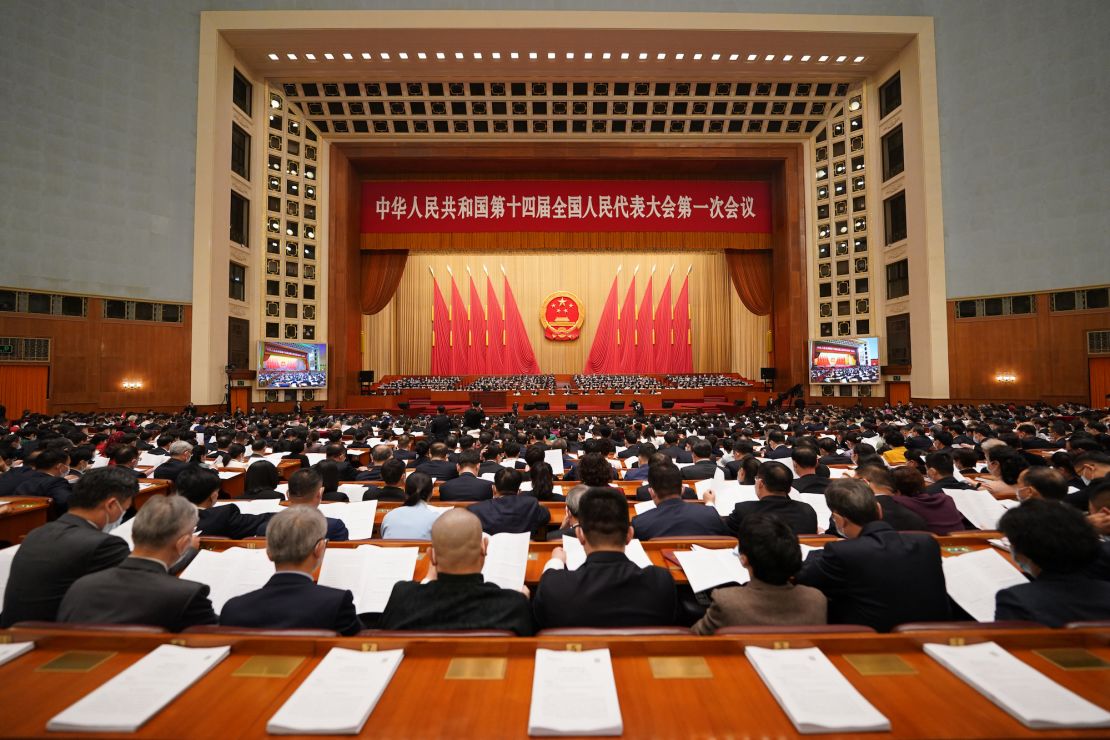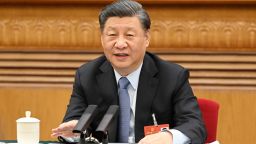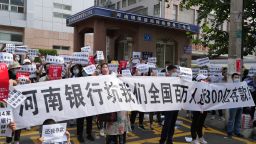China has announced a major government overhaul that will shakeup the oversight of its financial system and aims to boost its technological self-reliance, as a tech war with the United States intensifies.
The change to the State Council, the country’s cabinet, is the biggest in years and the third since Chinese leader Xi Jinping took power in 2013. The plan will further strengthen Xi’s personal control over government institutions and allow him to install more trusted men in key posts.
A tighter grip over key departments is perceived to be helpful in aligning them with Xi’s priorities, which range from maintaining social and economic stability to managing rising geopolitical tension with the United States.
“These proposed institutional changes reflect key focus areas of Chinese policymakers in the next few years, namely improving financial regulation coordination to enhance financial stability,” Goldman Sachs analysts said on Wednesday.
The State Council, the government’s top executive body, oversees 26 ministries and dozens of ministry-level administrative bodies. While major decisions are ultimately made by the Communist Party’s Politburo, the State Council exercises a certain amount of power to implement those policies, especially in economic areas.
Beijing also plans to downsize the so-called “iron rice bowl,” a popular term for jobs with guaranteed security. The number of civil servant positions in the central government will be cut by 5% over the next five years.
Among the changes announced Tuesday during the annual gathering of the National People’s Congress, Beijing will set up a new powerful financial regulator: the National Financial Regulatory Administration (NFRA).
It will replace the China Banking and Insurance Regulatory Commission (CBIRC) supervising commercial banks and insurance companies.
It will directly manage the country’s major financial holding companies, including fintech giant Ant Group, a task that previously belonged to the People’s Bank of China. It will also be responsible for financial consumer protection and investor protection.
Some analysts said Beijing’s apparent move to reassert state control of the economy could frighten investors, said Ken Cheung, chief Asian foreign exchange strategist at Mizuho Bank.
“Sentiment may worsen as investors should remain cautious on any tasks of regulation tightening given the experiences in the tech sector, housing markets and private tuition industry,” he said. “It appears that the battles of regulation tightening are not yet over.”

A super regulator
China’s financial system has traditionally been jointly overseen by the People’s Bank of China, the CBIRC and the China Securities Regulatory Commission (CSRC).
Now, the new NFRA will supervise all financial sectors except the securities industry, which will remain under the CSRC.
The new regulator is meant to “better manage risks” in the financial system and strengthen the supervision of “institutions, behaviors, and functions,” the government proposal said. Supervision will be “penetrating,” it added.
“Establishing a super regulator will help enhance and broaden the regulation in financing and banking industries, which have becoming more complex and interlinking other industries,” said Cheung.
The move comes as risks to the stability of China’s financial system are rising amid a housing market slump and economic slowdown.
The property sector, which accounts for more than a quarter of total bank loans, is in the midst of its worst downturn on record.
Financial stress has already emerged in multiple areas, from last summer’s protests at rural banks in Henan to widespread mortgage boycotts and growing defaults by property developers.
As part of the overhaul, the CSRC will be upgraded from a “public institution” to a “government institution.” On top of its existing responsibilities, it will be given a new one for reviewing and approving corporate bond issuance, which currently falls under the National Development and Reform Commission.
This move demonstrates Beijing’s “increased focus on developing the equity market and pushing forward more direct financing to better allocate capital and help slow the buildup in debt,” Goldman Sachs said.
Achieving tech self-reliance
The proposal includes multiple efforts to boost China’s technology and innovation as it tries to counter growing restrictions from the United States on selling advanced technology to China.
The existing Ministry of Science and Technology will be restructured and enhanced. It will be tasked with advancing the “whole nation system” for innovation, with a greater focus on basic research and applying technology to existing industries.
“Facing the grim situation of the international tech race and external containment and suppression, [we must] … better coordinate scientific and technological forces to overcome difficulties in key core technologies, and quickly achieve self-reliance in advanced technologies,” the proposal said.
On Monday, Xi hit out at the United States, while calling on China’s private companies to flight alongside the Communist Party and boost growth and tech innovation.
China will also establish a new department to oversee its vast troves of data. The National Data Bureau will be tasked with drafting data-related regulations and coordinating the sharing and utilization of data.
“Data … is set to be increasingly important going forward,” Citi analysts said. “Its use will be put under [a] more structured regulation going forward.”
The previous regulatory onslaught on Big Tech might be over, but regulation of the industry will be more “normalized,” they said.
Beijing launched a sweeping regulatory crackdown against the country’s internet industry from late 2020 to 2022, which was aimed at bringing powerful tech companies in line with its priorities. The Communist Party made clear before the start of the crackdown that it needs “politically sensible people” in the private sector, who will “firmly listen to the party and follow the party.”
— CNN’s Wayne Chang contributed to this report.










